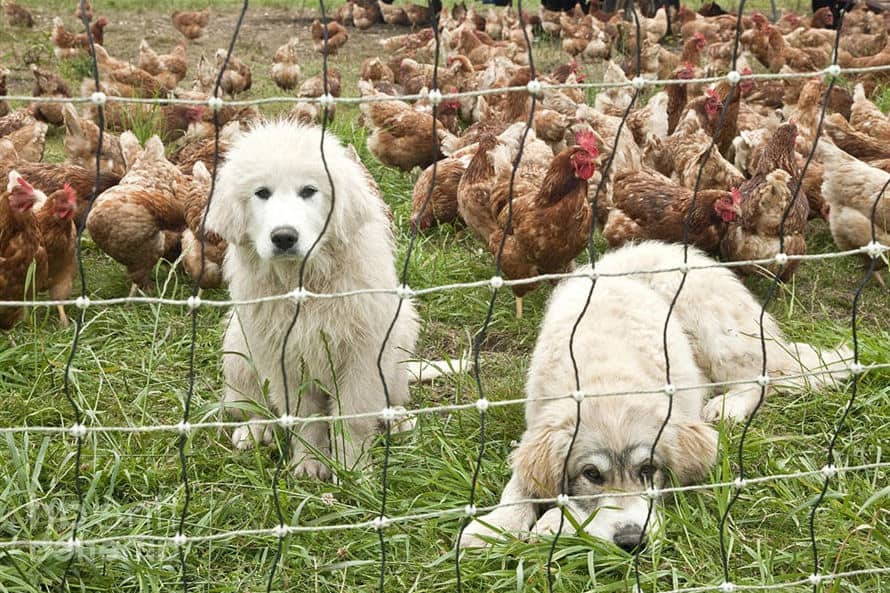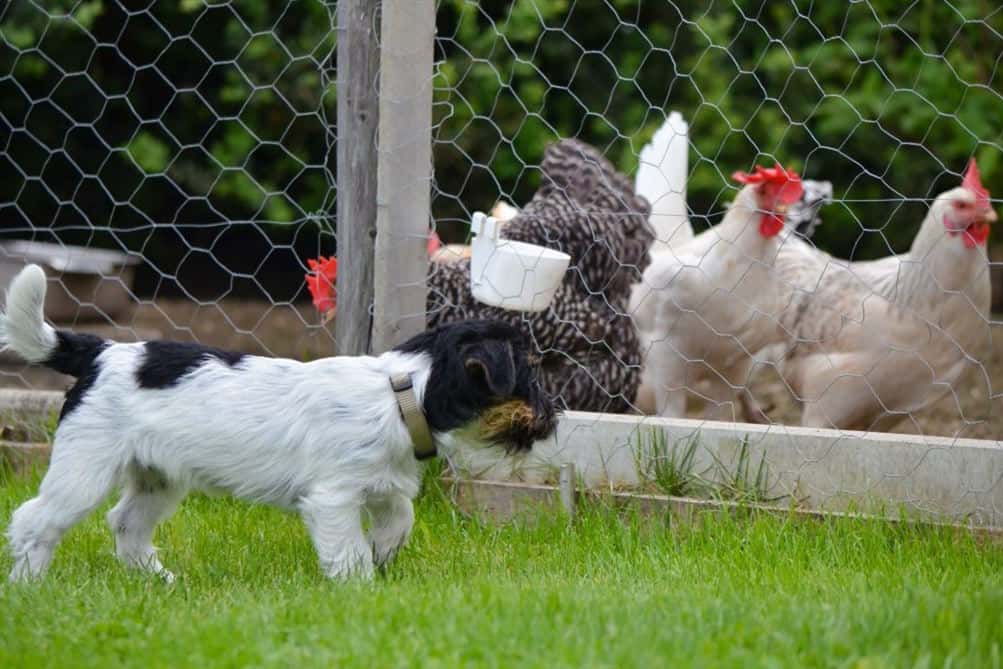If you have a smallholding and keep chickens, you might consider training a dog as a guardian to help keep your hens safe from potential predators like foxes, raccoons, hawks, and crows.
Read this guide to learn how to train your dog to protect your flock.
How Can Dogs Protect Chickens?
There are several ways in which dogs can protect your hens.
- If your hens live in a free-range setting, your dog can run loose among them, under supervision. If a predator approaches, the dog will chase the bad guy away, keeping your flock safe.
- Hens kept in a henhouse with a run need protection from predators that can dig underneath the run’s fencing during the daytime. A dog patrolling the outside of your chicken run will deter intruders.
- At night, chickens in a henhouse are vulnerable to attack by foxes and other predatory animals that can get into the house. A dog can sleep near the henhouse to frighten off any unwanted visitors that threaten your chickens.
A well-trained dog left outside at night under suitable conditions can also help keep your house safe from potential intruders by alerting you if strangers approach your property. As a bonus, your dog will stop raccoons from overturning your garbage cans at night!
What Dog Breeds Make Suitable Guardian Animals?
If you don’t already have a dog, you’ll need to know what breeds make the best choice as chicken guardians.
Although there are many livestock guardian dog breeds around, not all of them can be trusted with chickens. However, the Maremma sheepdog is one breed that’s born for the job.
Maremma sheepdogs, named after the region in Italy where they originate, come from Tuscany and Lazio. These dogs are bred to guard poultry and frighten off predators such as foxes and badgers.
Train Your Dog
Before introducing your dog to your chickens, you must train him to be obedient to basic commands. Your puppy should “sit,” “stay,” “lie down,” and go into its crate on cue. But the most important command for a poultry guardian is “leave it.”
Your dog must also be well-socialized. We recommend that you begin training your pup from puppyhood. Puppies are usually more receptive to training and new sights and sounds than adult dogs.
Throughout your training program, always use positive reinforcement methods. Remember that praise and treats are a far more effective way of getting your dog to listen to you and become obedient than punishment. Treat your dog as a comrade who you want to work with you, not for you.
It can be helpful to crate train your dog. That way, if you need to travel to your chickens’ location, you can put a dog travel crate in the cargo bed of your truck. You can also use a crate to potty train your puppy, prevent destructive behaviors from developing, and give the pup a sense of safety and security when you’re not around.
Expert trainers generally begin exposing their puppies to poultry when they are around nine weeks of age.
Poultry Protection Training

Once your puppy is obedient to a few basic commands, you can start training him to protect your chickens.
Desensitization
Start by working with your dog in a controlled environment.
Use a fenced area with few distractions to keep your dog’s attention on you, and your puppy will get used to the chickens without becoming overexcited. So, make sure you have plenty of time for the training session, switch off your cell phone, and pick a time when you can be confident that no one will call at your house.
De-Sexing
Female dogs can become “hormonal” and lose confidence when in heat, and entire male dogs are often more aggressive when they reach adulthood. So, we recommend that you have your puppy de-sexed as soon as he or she is old enough.
Generally, a neutered or spayed dog’s behavior is more predictable and reliable around your chickens than one that is still “unfixed.”
Muzzle – Yes or No?
When you first begin putting your dog in with your chickens, it’s a good idea to fit him with a muzzle.
A correctly fitted muzzle is there to prevent accidents should your dog become overexcited or forget his manners and begin chasing the chickens. Not every dog can be trusted around vulnerable fowl, and the muzzle is there to prevent accidents until you can be confident that your dog won’t misbehave.
Introductions
When you first take your dog to meet your chickens, it’s good to keep him on his leash. That can help to keep your pup calmer around the birds and keep him controlled.
Take your dog with you when you go to feed your chickens so that both parties become accustomed to each other. When entering the coop, remember to use simple commands, such as “sit.” That teaches the dog to respect the chickens’ boundaries.
Scenting
The scent of chickens can provoke a reaction in some dogs, but you can help to prevent that by familiarizing your dog with the chickens’ smell.
Take a damp cloth and rub it over some of your chickens so that the cloth carries the birds’ scent. Put the cloth in your dog’s crate or bed.
Keep The Peace
One of your dog’s guardian duties is to keep the birds from damaging each other. If you notice a scuffle breaking out between roosters or chickens, keep your dog on his leash and run toward the birds to break up the fight.
Once the warring parties are separated, reward your dog by giving him a treat and plenty of praise. That trains the dog to run to the flock’s aid if he hears a chicken in distress.
Identify Predators
Most dogs already know what’s a predator and what’s not. However, some creatures, such as chicken hawks and crows, are just as dangerous to chicks and juvenile birds as foxes and raccoons.
With your dog on his leash, be sure to chase away birds of prey and crows. Praise your dog and give him a treat. That way, your dog understands that he must chase off any flying predators and those on four legs.
Critter Patrol
Once your dog proves he understands your commands and can be trusted around your chickens, you can allow him to patrol your chickens’ run or coop for predators.
You already taught your guardian pup that he must rush to a chicken’s aid when he hears a bird in distress, so protecting the hens from predators should now come automatically to your dog.
Keep Fit!
An overweight, out-of-shape dog is not in any fit condition to effectively protect your chickens. So, be sure to take time out each day to take your dog for walks, enjoy playtime sessions of fetch and tug-of-war, and keep up with training sessions to keep your dog up to speed.
Final Thoughts
Keeping chickens can be a rewarding experience. Chicks make excellent pets, teaching children responsibility for other living creatures, and the birds can provide your family with a healthy supply of eggs for your breakfast table.
Your dog can help keep your flock safe from predators, giving you and your beloved chickens peace of mind to go about your day in peace.

Joseph Hudson has been raising chickens for over 15 years. In 2018, he completed the Agriculture & Natural Resources program at Mt. San Antonio College. He currently raises over 1400 chickens on his 7.5-hectare farm. He keeps sharing his experience on raising healthy and happy chickens on Chicken Scratch The Foundry.







